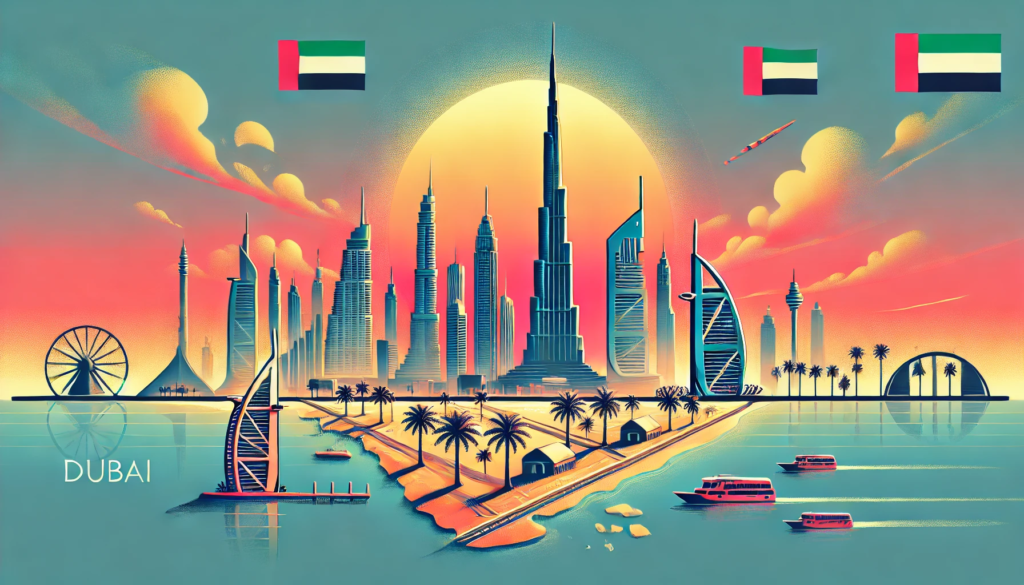Is Dubai a Country? Clearing the Confusion
When people think of Dubai, images of towering skyscrapers, luxurious shopping malls, and extravagant lifestyles come to mind. However, one question often arises among those less familiar with geography: Is Dubai a country? The short answer is no—Dubai is not a country, but rather one of the seven emirates that make up the United Arab Emirates (UAE). Let’s delve deeper to understand why this misconception exists and explore the fascinating role Dubai plays in the UAE.
Understanding Dubai’s Place in the UAE
The United Arab Emirates (UAE) is a country located in the Arabian Peninsula, bordered by Saudi Arabia to the south and Oman to the east. It was established in 1971, when seven emirates—Abu Dhabi, Dubai, Sharjah, Ajman, Umm Al-Quwain, Fujairah, and Ras Al Khaimah—came together to form a unified nation.
While Dubai is a prominent emirate, it is not the capital of the UAE. That title belongs to Abu Dhabi, the largest emirate by area and the center of political and administrative activities. Dubai, however, is often more internationally recognized due to its economic dynamism, tourism, and ambitious architectural projects.
Why the Confusion?
There are several reasons why people might mistakenly think Dubai is a country:
- Global Recognition: Dubai’s name is often mentioned in isolation, associated with iconic landmarks like the Burj Khalifa, Palm Jumeirah, and Dubai Mall. Its global prominence in trade, tourism, and finance makes it seem like a standalone entity.
- Media Representation: International media frequently highlight Dubai’s achievements without referring to the UAE, further reinforcing the perception of Dubai as an independent nation.
- Economic Power: Dubai is a major global hub for business and tourism, contributing significantly to the UAE’s economy. This economic dominance can create the impression that Dubai operates independently.
Dubai’s Unique Role
Dubai’s influence within the UAE cannot be overstated. While Abu Dhabi provides much of the UAE’s oil wealth, Dubai has diversified its economy, focusing on sectors like real estate, finance, technology, and tourism. This diversification has made Dubai a symbol of modernity and innovation.
Dubai is home to some of the world’s most ambitious projects, such as:
- Burj Khalifa: The tallest building in the world.
- Palm Jumeirah: A man-made island shaped like a palm tree.
- Expo City Dubai: The legacy of Expo 2020, showcasing innovation and sustainability.
Its strategic location and world-class infrastructure have also made Dubai a key transit hub, connecting East and West through its bustling Dubai International Airport (DXB).
How Dubai and the UAE Function Together
Although Dubai has its own government, headed by the ruler of Dubai, Sheikh Mohammed bin Rashid Al Maktoum, it operates under the federal framework of the UAE. The UAE has a federal government led by a president (currently Sheikh Mohamed bin Zayed Al Nahyan) and a Supreme Council consisting of the rulers of all seven emirates.
Each emirate retains a degree of autonomy, managing its own local laws and economic policies. However, they collaborate on issues like foreign relations, defense, and national identity, making the UAE a cohesive federation.
Frequently Asked Questions (FAQ)
1. What is the capital of the UAE?
The capital of the UAE is Abu Dhabi, not Dubai. Abu Dhabi is the largest emirate and the political and administrative center of the UAE.
2. Is Dubai larger than Abu Dhabi?
No, Abu Dhabi is the largest emirate by area, accounting for about 87% of the UAE’s total land. Dubai, while highly developed, is much smaller in size.
3. Does Dubai have its own currency?
No, the entire UAE, including Dubai, uses the same currency: the United Arab Emirates dirham (AED).
4. Can you travel between Dubai and other emirates easily?
Yes, travel between Dubai and other emirates like Abu Dhabi or Sharjah is straightforward, thanks to excellent road infrastructure and public transportation.
5. Is Dubai governed differently from other emirates?
While Dubai has its own ruler and local government, it is still part of the UAE’s federal framework. This means it collaborates with the other emirates on national issues.
6. What language is spoken in Dubai?
The official language is Arabic, but English is widely spoken, especially in business, tourism, and daily interactions.
7. Why is Dubai so famous?
Dubai’s fame comes from its modern architecture, luxury lifestyle, vibrant tourism sector, and status as a global business hub. Iconic projects like the Burj Khalifa and Palm Jumeirah have further enhanced its reputation.
8. Is Dubai safe for tourists?
Yes, Dubai is considered one of the safest cities in the world, with low crime rates and strict law enforcement.
Conclusion
To summarize, Dubai is not a country, but rather a thriving emirate within the United Arab Emirates. Its global prominence, economic achievements, and iconic landmarks might make it appear like a nation of its own, but it operates as part of a larger federation.
Next time someone asks if Dubai is a country, you can confidently set the record straight—and perhaps share some of the fascinating reasons behind this common misconception.


